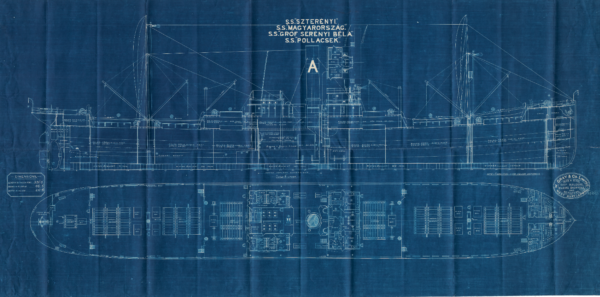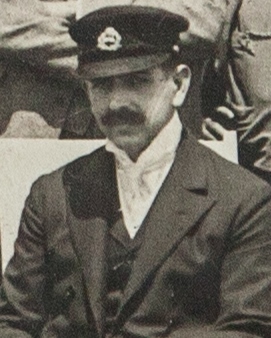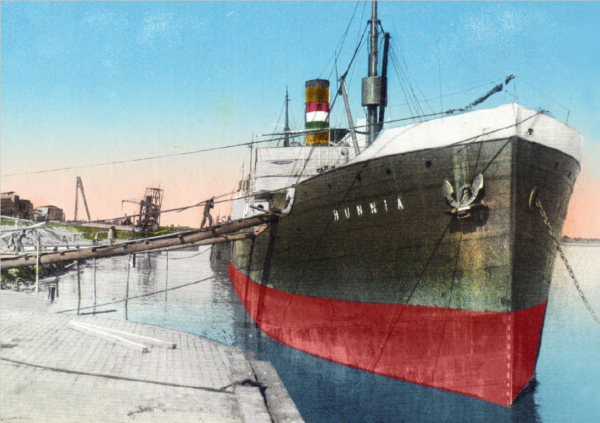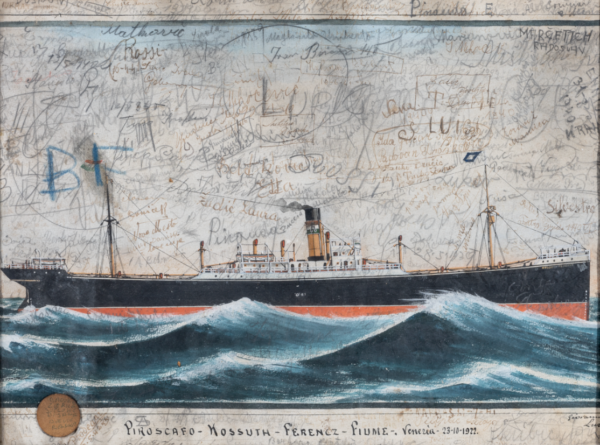"Atlantica" shipping r.t.

Atlantica Shipping Company was founded in 1907 by the new Free Navigation Act[i] was founded by politicians, wealthy Budapest merchants, bankers and heads of state-owned companies at the same time as it was adopted, already counting on the support it contained.[ii] The company's share capital was 4 000 000 crowns (20 000 shares of 200 crowns each), of which 70% was held by the Anglo-Austrian Bank. In addition to the bank's representatives (Ignác Dóczi, Pál Engel, Gyula Landesberger), the shareholders included the politician Károly Morawitz (10%), Dr. Izidor Petschek (10%), timber merchant Jenő Pollacsek (2,5%), and with one share each Béla Serényi, politician, Zsigmond Kotányi, a manager of MÁV from Algyő, and István Batthyány, retired secretary of the Ministry of Finance, as well as other employees of the bank and their relatives.[iii] The establishment of the company was supported by the then Minister of Trade, Ferenc Kossuth Ferencz, and his Secretary of State, József Szterényi. The involvement of the commercial politicians involved in its establishment led to a sharp criticism by Lajos Bájjer in the 4 October 1907 issue of the newspaper Constitution.[iv] The editorial pointed out a strong suspicion of corruption, since the company had already started building steamers in England before the 1907 law was passed, with shipbuilding subsidies that complied with the law, and the nationality of the crews on the ships that were put into service did not comply with Law XVI of 1879, i.e. there were few Hungarian sailors and commanders on ships built with state money.[v] The newspaper claimed that unemployed sea captains in Fiume felt insulted by the situation. The operation of the newspaper, Constitution, was strongly influenced by the Rijeka Sirius Lodge, through editor Bájjer, which included many members who saw the newly formed Atlantique and Pollacks as a genuinely dangerous competitor.[vi] Atlantica also hired Hungarian seafarers in connection with the case, but the financial concerns in the background had to be settled by the Maritime Authority under Secretary of State Szterényi.

Atlantica's statutes stated that the company's purpose was long-distance shipping.[x] The company sought to achieve this through its agencies in the main ports. The company was based in Budapest, where it maintained a head office with 25 employees under the management of Béla Geiger, E. Oszkár Solymássy, Dr. Ödön Fónagy and Ferencz Czanich (the former Atlantica headquarters can still be found at 18-20 Falk Miksa u.); a branch office with three employees in Rijeka; two agencies in Odessa and five in Nikolaev; a representative office with 16 employees in Braila, two in Sulina and one in London.[xi] The company made extensive use of the contact system of CEO Jenő Polnay.
When the company was founded in 1907, it built six modern ocean liners; four to the same design in West Hartlepool (Szterényi, Hungary, Count Béla Serényi, Pollacsek) and two in Sunderland (Ferenc Kossuth, Morawitz). The steamships were named after Atlantica's shareholders and the politicians who helped to establish it. (The steamship Pollacsek was renamed Polnay after a nobility grant and name change in 1911.) After the scandal surrounding the foundation, there was a striking case of ship purchases: in 1910, a relatively small ocean liner, the Tengers, was purchased, and the minimum required to meet the 1907 Free Navigation Act's ship purchase subsidy (2-3 full cargoes of domestic interest) was met, and the steamer was sold at the end of 1911. They then applied to the state for subsidies for 1912 and received the total amount of 97 600 crowns.[xii]
In 1911, the company increased its share capital to 6 000 000 Crowns, with the involvement of new shareholders, in order to build new steamers.[xiii] The Budapest and the Rijeka were built in Stockton on Tees, the Count Khuen-Héderváry, the Atlantica and the Hunnia in Newcastle. The company thus averaged 15 873 NRT of pure shipping capacity in the four years 1907-1910 and 28 598 NRT in the four years 1911-1914. After the steamships, a total of K 3 531 730 was granted in shipbuilding subsidies until 1918.[xiv]

To reconstruct the traffic of Atlantica, we can work with three sources. The first are the logbook vouchers of each of the company's ships, which contain details of a voyage; the second are the annual turnover statements of the Maritime Authority of Fiume; and the third are the minutes of the company's annual general meetings, which contain the aggregate cargo traffic for the year.[xv] These show that the commercial agencies set up by the company played a key role in its turnover and that until 1912 the company even had to use chartered steamers to carry so many orders. From its foundation until the outbreak of the First World War, Atlantica's own ships made 483 voyages between 81 ports, covering 1 723 331 nautical miles. In addition, chartered steamers covered a further 368 922 nautical miles.
Atlantica's trade can be grouped into three categories, based on its direction. On the one hand, several steamships were regularly observed to transport grain and timber from Transylvania (from Polnay's forestry holdings) from the ports on the Lower Danube and Black Sea to Alexandria and Rotterdam, and then coal and coke from Dutch and English ports (e.g. Cardiff) to Rijeka or the Lower Danube ports. Thirdly, there were also other shipments to Rijeka, typically for the 'domestic economy' (sic!), such as rice from Indonesia, phosphate from the Christmas Islands or cotton from the south-eastern ports of the United States. And thirdly, there were other freighter shipments between ports around the world.[xvii]
The Atlantica's total cargo volume between 1907 and 1914 was 2 912 162 t, of which 81% (2 369 037 t) was carried on its own steamers and 19% (543 125 t) on chartered vessels. Three destinations stood out in terms of the direction of freight traffic: own steamers transported 48,68% of the total to the Danube ports, 38,96% to Rotterdam, 20,64% to Rijeka.
The 1907 Free Navigation Act also provided concessions and some funding for the Atlâtata. Until the end of the war, this amounted to a total of K K 3 531 730 in nominal terms. In addition, according to the freight data recorded, they also received a freight subsidy of at least K 931 894. The rest of the company's income came from free shipping. The net profit after deduction of costs was allocated in four ways. Firstly, the annual general meeting fixed the dividend to be paid to the shareholders, then the additional dividend to the founders. Part of the remainder was placed in the reserve fund and the rest was paid to the management as a bonus. It can be seen that Atlantica was able to operate profitably from the first year of business in 1907, paying an average dividend of 51T$3,000 to shareholders in the first four years of its existence, and then dividends of 8-101T$3,000 in the second four years, following the capital increase.

[i] 1907:VI. tc.
[ii] DAR. TH. 415-1907-XXI-437.
[iii] DAR. TH. 460-1908-XX-3426.
[iv] For more on Bájjer, see Poppy 2019.
[v] DAR. TH. 415-1907-XXI-437.
[vi] MNL. OL. P-1083; P-1134.
[vii] Libri Regii 71:603.
[viii] Collection by Tamás Takáts.
[ix] MEASURE.
[x] DAR. TH. 539-1910-II-2768.
[xi] DAR. TH. 583-1911-II-3058.
[xii] DAR. TH. 623-1912-I-128; State Budget 1912:895-898.
[xiii] DAR. TH. 630-1912-II-636.
[xiv] State Budget 1917-1918:979-980.
[xv] Atlantica papers 2019.
[xvi] Atlantica papers 2019.
[xvii] Atlantica papers 2019.
[xviii] Atlantica papers 2019.
Date of foundation: 1906
Date of cessation: 1944
Founders: Jenő Polnay, Anglo-Hungarian Bank, Barons Groedel
Decisive leaders:
1906-1944 | Jenő Polnay from Tiszasüly |
Main activity: maritime shipping
Author: by Dr. Márton Pelles
Date of foundation: 1906
Founders: Jenő Polnay, Anglo-Hungarian Bank, Barons Groedel
Decisive leaders:
1906-1944 | Jenő Polnay from Tiszasüly |
Main activity: maritime shipping
Main products are not set
Seats are not configured
Locations are not set
Main milestones are not set
Author: by Dr. Márton Pelles
"Atlantica" shipping r.t.

Atlantica Shipping Company was founded in 1907 by the new Free Navigation Act[i] was founded by politicians, wealthy Budapest merchants, bankers and heads of state-owned companies at the same time as it was adopted, already counting on the support it contained.[ii] The company's share capital was 4 000 000 crowns (20 000 shares of 200 crowns each), of which 70% was held by the Anglo-Austrian Bank. In addition to the bank's representatives (Ignác Dóczi, Pál Engel, Gyula Landesberger), the shareholders included the politician Károly Morawitz (10%), Dr. Izidor Petschek (10%), timber merchant Jenő Pollacsek (2,5%), and with one share each Béla Serényi, politician, Zsigmond Kotányi, a manager of MÁV from Algyő, and István Batthyány, retired secretary of the Ministry of Finance, as well as other employees of the bank and their relatives.[iii] The establishment of the company was supported by the then Minister of Trade, Ferenc Kossuth Ferencz, and his Secretary of State, József Szterényi. The involvement of the commercial politicians involved in its establishment led to a sharp criticism by Lajos Bájjer in the 4 October 1907 issue of the newspaper Constitution.[iv] The editorial pointed out a strong suspicion of corruption, since the company had already started building steamers in England before the 1907 law was passed, with shipbuilding subsidies that complied with the law, and the nationality of the crews on the ships that were put into service did not comply with Law XVI of 1879, i.e. there were few Hungarian sailors and commanders on ships built with state money.[v] The newspaper claimed that unemployed sea captains in Fiume felt insulted by the situation. The operation of the newspaper, Constitution, was strongly influenced by the Rijeka Sirius Lodge, through editor Bájjer, which included many members who saw the newly formed Atlantique and Pollacks as a genuinely dangerous competitor.[vi] Atlantica also hired Hungarian seafarers in connection with the case, but the financial concerns in the background had to be settled by the Maritime Authority under Secretary of State Szterényi.

Atlantica's statutes stated that the company's purpose was long-distance shipping.[x] The company sought to achieve this through its agencies in the main ports. The company was based in Budapest, where it maintained a head office with 25 employees under the management of Béla Geiger, E. Oszkár Solymássy, Dr. Ödön Fónagy and Ferencz Czanich (the former Atlantica headquarters can still be found at 18-20 Falk Miksa u.); a branch office with three employees in Rijeka; two agencies in Odessa and five in Nikolaev; a representative office with 16 employees in Braila, two in Sulina and one in London.[xi] The company made extensive use of the contact system of CEO Jenő Polnay.
When the company was founded in 1907, it built six modern ocean liners; four to the same design in West Hartlepool (Szterényi, Hungary, Count Béla Serényi, Pollacsek) and two in Sunderland (Ferenc Kossuth, Morawitz). The steamships were named after Atlantica's shareholders and the politicians who helped to establish it. (The steamship Pollacsek was renamed Polnay after a nobility grant and name change in 1911.) After the scandal surrounding the foundation, there was a striking case of ship purchases: in 1910, a relatively small ocean liner, the Tengers, was purchased, and the minimum required to meet the 1907 Free Navigation Act's ship purchase subsidy (2-3 full cargoes of domestic interest) was met, and the steamer was sold at the end of 1911. They then applied to the state for subsidies for 1912 and received the total amount of 97 600 crowns.[xii]
In 1911, the company increased its share capital to 6 000 000 Crowns, with the involvement of new shareholders, in order to build new steamers.[xiii] The Budapest and the Rijeka were built in Stockton on Tees, the Count Khuen-Héderváry, the Atlantica and the Hunnia in Newcastle. The company thus averaged 15 873 NRT of pure shipping capacity in the four years 1907-1910 and 28 598 NRT in the four years 1911-1914. After the steamships, a total of K 3 531 730 was granted in shipbuilding subsidies until 1918.[xiv]

To reconstruct the traffic of Atlantica, we can work with three sources. The first are the logbook vouchers of each of the company's ships, which contain details of a voyage; the second are the annual turnover statements of the Maritime Authority of Fiume; and the third are the minutes of the company's annual general meetings, which contain the aggregate cargo traffic for the year.[xv] These show that the commercial agencies set up by the company played a key role in its turnover and that until 1912 the company even had to use chartered steamers to carry so many orders. From its foundation until the outbreak of the First World War, Atlantica's own ships made 483 voyages between 81 ports, covering 1 723 331 nautical miles. In addition, chartered steamers covered a further 368 922 nautical miles.
Atlantica's trade can be grouped into three categories, based on its direction. On the one hand, several steamships were regularly observed to transport grain and timber from Transylvania (from Polnay's forestry holdings) from the ports on the Lower Danube and Black Sea to Alexandria and Rotterdam, and then coal and coke from Dutch and English ports (e.g. Cardiff) to Rijeka or the Lower Danube ports. Thirdly, there were also other shipments to Rijeka, typically for the 'domestic economy' (sic!), such as rice from Indonesia, phosphate from the Christmas Islands or cotton from the south-eastern ports of the United States. And thirdly, there were other freighter shipments between ports around the world.[xvii]
The Atlantica's total cargo volume between 1907 and 1914 was 2 912 162 t, of which 81% (2 369 037 t) was carried on its own steamers and 19% (543 125 t) on chartered vessels. Three destinations stood out in terms of the direction of freight traffic: own steamers transported 48,68% of the total to the Danube ports, 38,96% to Rotterdam, 20,64% to Rijeka.
The 1907 Free Navigation Act also provided concessions and some funding for the Atlâtata. Until the end of the war, this amounted to a total of K K 3 531 730 in nominal terms. In addition, according to the freight data recorded, they also received a freight subsidy of at least K 931 894. The rest of the company's income came from free shipping. The net profit after deduction of costs was allocated in four ways. Firstly, the annual general meeting fixed the dividend to be paid to the shareholders, then the additional dividend to the founders. Part of the remainder was placed in the reserve fund and the rest was paid to the management as a bonus. It can be seen that Atlantica was able to operate profitably from the first year of business in 1907, paying an average dividend of 51T$3,000 to shareholders in the first four years of its existence, and then dividends of 8-101T$3,000 in the second four years, following the capital increase.

[i] 1907:VI. tc.
[ii] DAR. TH. 415-1907-XXI-437.
[iii] DAR. TH. 460-1908-XX-3426.
[iv] For more on Bájjer, see Poppy 2019.
[v] DAR. TH. 415-1907-XXI-437.
[vi] MNL. OL. P-1083; P-1134.
[vii] Libri Regii 71:603.
[viii] Collection by Tamás Takáts.
[ix] MEASURE.
[x] DAR. TH. 539-1910-II-2768.
[xi] DAR. TH. 583-1911-II-3058.
[xii] DAR. TH. 623-1912-I-128; State Budget 1912:895-898.
[xiii] DAR. TH. 630-1912-II-636.
[xiv] State Budget 1917-1918:979-980.
[xv] Atlantica papers 2019.
[xvi] Atlantica papers 2019.
[xvii] Atlantica papers 2019.
[xviii] Atlantica papers 2019.